nothing here but 2024 no more
issue 276 - 22nd December, 2024
CJW: It’s that time of the year where everyone deserves a bit of a break - including us. So we’ve put together a selection of previously shared links and thoughts from the year past.
If you would like to support us, you’ve got a couple of options:
Both will give you access to the full bonus archive, as well as new bonuses as they are posted. You can also forward this email to anyone you think might enjoy it and help spread the word.
Thank you for joining us, and we hope you have a restful holiday period, whichever holiday it is you celebrate.
Corey Jae White
author, voidwitch, angel on a satellite.
2024 was kind of a huge year for me. Started HRT, continued socially transitioning after starting late last year, the day job got a lot busier, got my first freelance writing gig and have been enjoying that challenge, wrote some great collaborative stories with Maddison Stoff (will have some news to share about that next month…), did some of my own writing that I’m proud of, wrote my first poems in about 25 years, learned a lot about myself, lost our darling old lady cat Ella to cancer (Round 2 - she beat it once, but the second time around she was that much older and too tired to fight it), and got to spend the last few months mending that heartache by looking after a cat for someone between permanent residences. And lots more I’ve forgotten or don’t want to go into here. It’s hard to imagine the year is almost over, but I also crammed a lot into those months.
Anyway, time to share some things from throughout the year that I want to further highlight.
//
How Infinite Jest tethered me to life when I almost let it go - Mala Chatterjee at Aeon
Hungerford, Lockwood and the mainstream ethos generally dismiss the book’s intended and actual audiences as white, male and not to be trusted, driven by Stockholm syndrome, sunk costs or delusions of self-interested grandeur in calling the book genius or important. I’m not exaggerating when I say that I find these critiques – so often snide or irreverent in their cadence – baffling, gaslighting, disempowering, at times even agonising. I can’t understand what they could possibly have to do with this book that I know as my friend, that I found myself in at my most alienated moment. And the bitter irony is that this ethos all concerns a man who, after writing such an empathetic book about mental illness, took his own life; for it is a collective instance of the very kind of empathy failure that I think Infinite Jest asks us to resist and helped me resist myself. I guess it is the least I can do for it now – and for my own survivor’s guilt – to join this ongoing chorus on the book with my own belting, discordant voice.
Initially I wasn't going to share this piece, precisely because of the argument referred to here. I understand wanting to shit on something that's perceived to be a signifier of a certain kind of terrible white guy, but I do think the book deserves better, not least for its empathy and the way it describes depression, as outlined in this piece.
I have a different relationship to my own depression now than when I read IJ, so this piece makes me wonder what I might get out of it on another read.
//
An animal myself - Erica Berry at Aeon
Today, there is perhaps no animal we are more unmoored from than ourselves. ‘The world is now dominated by an animal that doesn’t think it’s an animal,’ writes the natural philosopher Melanie Challenger in How to Be Animal (2021). ‘And the future is being imagined by an animal that doesn’t want to be an animal.’ It is shame that drives us to evade our animality, contends philosopher Martha Nussbaum in the book Hiding from Humanity (2004), so uncomfortable are we with our own ‘propensity to decay and to become waste products ourselves’. The more we confront the degradation of our oceans and lands, however, the more we must face that it’s not just animal habitat under threat – it’s our habitat, too. Faced with this mounting unliveability, we look to the nonhuman for ideas of survival. To be a rat in a rotting city is to make out OK. [...] Labelling individuals as ‘animals’ – refuting their humanity – has long been a project of the racist, colonial, sexist imagination. Only by rejecting these legacies of white-settler anthropocentrism can we imagine better, less hierarchical ways of existing among, between, and within species.
I'm always gonna share essays about human/animal phenomenology because it's an area I find fascinating, and as someone with a lot of empathy for/with animals it's something I think about a lot. Plenty of interesting thoughts here, but I particularly liked this:
In a gamified research study he calls ‘Project Shell’, participants take on the body of a loggerhead sea turtle, trading their arms for flippers as they dodge passing ships and fishing flotsam on their journey from hatchling to adult. Pimentel found that participants left the game with new environmental attitudes, increased compassion, and a willingness to donate to marine conservation efforts. ‘Your brain stores [virtual reality] experiences in autobiographical memory,’ he told me. ‘It’s happening to you, versus something you’re seeing.’ Players adopted what he calls a ‘body transfer’ response, perceiving themselves as turtles.
It's not surprising when I've read other pieces about people rapidly adapting to additional prosthetic sensory devices, but it's still fascinating and further encourages me to consider a future of deep human-animal connection and collaboration.
//
A New Lawsuit Shows How Recklessly Facebook Endangers Kids - Rob Larson at Jacobin
Not helping the case is recent reporting, led by the Wall Street Journal, on Instagram’s video feature, Reels, which is designed to maximize user interaction much like the rest of the online platforms. Starting with the simple observation that many accounts of young women influencers, like gymnasts or product reviewers, have large numbers of adult men among their followers, the Journal created dummy accounts to follow these same young women.
The dummy accounts were then encouraged by the algorithm to follow other adult users who post extensively about sex with adults and young people, and then shown video after video of adult sex, young people engaged in flirtatious activity, and ads for national brands. The paper’s reporters concluded that “while gymnastics might appear to be an innocuous topic, Meta’s behavioral tracking has discerned that some Instagram users following preteen girls will want to engage with videos sexualizing children, and then directs such content toward them.”
It will be difficult for Meta to top its promotion of genocide, but building a gymnastics to CSAM pipeline has got to come close.
//
The Gaza Massacre Is Undermining the Culture of Democracy - Enzo Traverso at Jacobin
After October 7, most Western media, including many prestigious and supposedly serious newspapers, published news about pregnant women disemboweled and children beheaded or put in ovens by Hamas fighters. These inventions spread by the Israeli army were immediately accepted as evidence — both Joe Biden and Antony Blinken repeated them in their speeches — whereas their refutation was only whispered at the margins a few weeks later. Myths are performative, as Bloch observed: “The moment an error becomes the cause of bloodshed it is irrevocably established as truth.”
I included this because while it's about Gaza, it's also about the broader democratic and cultural fallout of the "war" and the ways Israel and its supporters in the West are conducting themselves in regards to media and propaganda.
A must-read essay, one I'm surprised I haven't seen getting shared online.
If terrorism is always unacceptable, that of the oppressed is usually engendered by that of their oppressor, which is far worse.
//
Why Max Hass Matters - Joshua M. Henson at Unwinnable
What the game doesn’t wear on its sleeve are the radical modes of resistince in its relentless empathy for those who either will not or cannot work for the Nazis. The Kreisau Circle does not discriminate on any basis: Europeans, Americans, Black Liberation Army-esque New Yorkers, communists, the mentally ill, and the physically disabled are all welcomed and accepted, and allowed to contribute based on their ability. There is no means test to be welcomed as an anti-fascist.
[...]
While still limited due to his needs, Max Hass is accepted and integrated into the broader resistance. He still spends time playing with toys, doodling, and drawing on people’s clothing without their permission, but Max is also permitted to contribute to plans, go on missions, and communicate with B.J. while on the field. The game never permits the characters to infantilize him. While Max Hass may come across as a “’simpleton,” he is incredibly astute. All of the characters address him as an equal, and while they may soften their tone to be mindful of his needs, it is never done in a way that comes across as dismissive or distant.
This is a fantastic piece on Wolfenstein II and the way the anti-fascist gang of protagonists accepts Max Hass on his terms, per his needs and abilities. It’s been a few years since I played the game, but the devs really weren’t fucking around with representation - not because they ticked some arbitrary boxes, but because they treat this varied gang with empathy and do a fantastic job of demonstrating their humanity (period, and also in contrast to the hateful fascist idelogy of the Nazis).
[Corey of the future update: This sort of representation seems only more important today - not just because of all the stupid fucks on their “anti-woke” crusade in video games, but also because of the increasingly fascist turn of our politics and culture. That a AAA game was released just a few years ago with these politics is kind of incredible - not for what it stood for at the time, but for how far we’ve regressed in the short time since.]
//
The Destruction of Palestine Is the Destruction of the Earth - Andreas Malm at Verso
There is an odd spiral of reality and fantasy at work in the moment of 1840: the British really did turn one Palestinian town into ruins. Then they started imagining that all of Palestine was one landscape of ruins – desolate, deserted, depopulated; fanciful constructions at best, but rather adequate representations of what Akka seems to have looked like after 3 November. In the next coils of the spiral, the ideational emptying of the land became a precursor to the real thing. ‘Earth without people’ read the prescription for a Nakba. Ever the pioneers, the British undertook a prefigurative elimination of the Palestinian people. At this moment in time, curiously, Jews still had a position rather symmetrical to the Palestinians: they existed as characters in the plot, but purely in the realm of the imagination. Actual Jews did not count. Jews did not clamour to abandon their homes for Palestine – rather, to the contrary, as even one Zionist scholar has noticed, ‘British Jewry was opposed to “anything that might seem to impugn its status as ‘wholly’ English.” English Jews could only be embarrassed by the suggestion that they were waiting to go back to Palestine’. Before Zionism was Jewish, it was imperial.
This is a very long piece that combines the long threads of history pertaining to the current genocide in Gaza, the rise of fossil imperialism as represented by British steam ships (and of course, the related anthropogenic climate change), and Zionism as a product of said imperialism.
It could best be summarised this way:
The steps along the way to the destruction of Palestine were simultaneously steps along the way to [the destruction] of the Earth.
It continues to make important points right up until the end, so I highly recommend making time to read this piece if you want a deeper understanding of the full extent of the imperial project that is taking place in occupied Palestine. It’s over 18k words, so I feel like I’m setting you homework, but for a certain kind of NH subscriber, this is a must-read.
//
Zankyou no Terror / Terror in Resonance

I finally got around to watching this anime mini-series from 2014 recently, after having it on my watchlist for years. It follows two teenage boys, survivors of a secret experimental program that sought to weaponise their savant-like intelligence.
It’s hard to know what more to say about the show. I could give you a basic rundown of the plot, but it seems largely beside the point - I’m recommending you watch it, so you’ll see for yourself soon enough. It’s very much a vibes-based show - gorgeous art, interesting characters, but with nothing particularly unique going on with the plot. Still, by the end it’s a gripping narrative, and, as you can probably guess from the title, it raises some worthwhile questions about the nature of terror and terrorism that seem only more relevant now than they would have been a decade ago when the show was released.
If you’ve read or watched How to Blow Up a Pipeline (and I recommend both), then you’re already familiar with Andreas Malm’s arguments for sabotage in the face of entrenched fossil fuel infrastructure and interests (double-Malm issue today, apparently). And then we look at the university protests in the US - where thousands of citizens are peacefully protesting their nation’s complicity in genocide, and being met with violence from the forces of the state who are supported by the captured media and media class - then you might start to wonder what options are left when peaceful protest is spoken of as though it is violence, when resistance is treated like terrorism.
When the state (and/or capital) is so resistant to the will of the people, then some of those people will see terror as their only way to be seen and heard. And depending on the targets and tactics they use, they could potentially come across as more reasonable than the increasingly violent and authoritarian state (just look at all the anti-protest laws being introduced across the US, UK, Australia, and elsewhere) they’re fighting back against.
That’s what I was thinking about when I finished the show. I expect we could see more art grappling with the idea of terrorism as a valid response to the state of the world, and I’m fascinated by that (I will almost certainly be looking to explore it in a fiction project in the future), but I’m also terrified about what we might see happen in the real-world.
[Future Corey update: Damn, I’m a fucking prophet sometimes. Also, since writing the above, I’ve started actively working in a subgenre I like to call Terrorpunk.]
//
She Said I Want Something That I Want - Stefan Kelly (via Austin)
The version of you that now counts to your self-conception is the one staring back at you, not the one that takes it in. The one in the mirror is the one with an identity. With a story. And that story only make sense when you see yourself fitting in with all the other things. With all the other words. With all the other symbols.
From that moment on, you’ve been more than a being that behaves on pure instinct and sensory input. That behaviour got added up into something more. Your vision became mediated.
You entered the world of symbols, and you would never leave again.
A really fascinating (and really long) piece about how culture writers get it wrong when they write about culture, but also why they get it wrong - perception, reality, hyperreality, the symbol vs the actual, yearning as the meaning of life, etc etc.
I feel like it's changing the way I think about things, but it's also so long and meandering (complimentary) that I think it'll take a while to fully process.
A must read.
//
Dreaming awake - Mandy Brown
To engineer is to design or construct something. To engineer consent is to both subvert the agency necessary for consent to exist and to make plain that the person being engineered is seen as a device or a product, a thing to be manipulated or arranged. In that, engineering consent bears relation to what Ursula Franklin warned of with the proliferation of prescriptive technologies—technologies in which autonomy and judgment are suppressed in favor of following instructions—which is that such technologies pave the way for the programming of people. To use advertising—or propaganda, which is the same thing—to engineer consent is to program people to accept a message.
A brilliant piece on media and propaganda (which includes social media platforms these days, of course), and ways to think about resisting it and finding another way/place to look. That might sound a bit vague/abstract, but I don't want to tell you what you'll take away from this, as I think it will differ broadly.
Marlee Jane Ward
is also Mia Walsch. Writer & visual artist. Hates the internet.
This year I hated the internet more than I ever had, and mostly tried to avoid it. I wrote some articles and finished rewriting a novella that you might see some time next year. I lost all hope in humanity over and over and over again. Anyway, here’s some stuff I thought was worth sharing the first time, and sharing again now.
//
MJW: Big Mood
Nicola Coughlan is by turns effervescent and relatably, realistically depressed as bipolar Maggie in this comedy drama series. She can do little wrong rn, I love her in everything I see her in. Lydia West as Eddie is the supportive bestie with her own shit going on. I loved the way this captured the very real feeling of a mood disorder – the ‘great’ ideas you have when you’re up, the way everything falls apart when you’re down. Both characters captured the essence of how it’s both easier and much harder to ignore your problems, even when everything is poised to fall apart. Highlights are Eddie throwing a surprise birthday party for a very depressed Maggie who tries to take the edge off with mushrooms, and Maggie’s disastrous dinner party with her agent.
//
MJW: The Substance (2024)
What a fucking ride! Everyone is talking about The Substance, and that’s because it’s really good. Demi Moore is perfect as ageing TV star Elisabeth Sparkle. She comes across The Substance, a drug that can create a ‘better’ version of yourself, and sort of births the young-and-hot Sue, played by Margaret Qualley. If you like body horror, satire, aerobics, lingering closeups of flawless asses, horrific consequences, and SHIT TONS of full frontal nudity, The Substance will be right up your alley.
//
MJW: Alien: Romulus
I hadn’t even known that there was a new Alien movie coming out up until a week before seeing it. This is what happens when you largely avoid the internet. I didn’t bother reading up on it, and went into the cinema cold. Imagine my surprise when I saw old tech in the style of the 1979 Alien! Amazing! Romulus imagines a story in between Alien and Aliens, which you probably already know if you actually pay attention to anything. Cailee Spaeny’s Rain wants to leave her mining outpost home for a newer colony, and I found the detail of Weyland-Yutani changing the requirements of her indenture just as she’d met them to be très modern. What followed was a reasonably predictable, and sometimes silly, but ultimately fun and a touch horrifying Alien film that I enjoyed a lot. There’s something to be said for watching an Alien movie at the cinema with a fellow fan of the franchise. Watch if you love red and orange lit-up buttons on spaceship panels, chucks as future fashion footwear, and the old acid-for-blood. Points off for AI Ian Holm, who just didn’t look right.
//
MJW: We Are The Relief: How Queer Appalachian Mutual Aid Showed Up After Helene - Basil Vaughn Soper at Them
Long before FEMA had any presence in Western North Carolina, Pansy Collective distributed six truckloads, two trailers, and a box truck filled with non-perishable food, water, cleaning supplies, diapers, gas and gas cans, toiletries, batteries, and hygiene products to various hubs, including remote mountain locations where residents were unable to leave.
[...]
He recounts how two tattooed trans folks set out to deliver water and insulin to someone stranded on a mountain in Clyde. When they needed help, a group of local “good ol’ boys” on ATVs offered them a ride without hesitation. These moments remind us that Southerners often unite, understanding what it means to be marginalized, and come together in times of need, regardless of politics.
This is the future. No one is coming to help our communities, we gotta take care of each other. And that might mean people you don’t agree with, because mutual aid includes alllll of us.
//
MJW: Civil War
I adore Kirsten Dunst, have enjoyed Alex Garland’s stuff in the past (The Beach is still one of my favourite books), and am historically interested in dystopian fiction (though… not as much these days), so despite reading a few negative reviews, I was still interested in seeing Civil War. Now that I have, I’m not sure if I liked it or didn’t, if it was good, or wasn’t. It’s a realistic depiction of what a civil war in the US could look like, yes. It’s no different from any war zone in any country that hasn’t enjoyed ‘peace’ in the recent past, and maybe that’s why Kirsten Dunst’s war journalist character Lee is so numb. She’s seen it before, and just because it’s the country she was born in doesn’t change that. Maybe once you’ve switched off enough to be able to bear it, once you’ve put the camera’s lens between you and it for so long, it’s impossible to feel horror again. Yeah, maybe that’s kinda relevant for us right now as we’re watching a genocide on phone screens… Anyway, she passes this detachment on to Cailee Spaeny’s self-appointed apprentice, Jessie, as they travel to DC with an outlandish plan to interview the President. At the end of the film I told my housemate: “That felt like an exercise in numbness.”
//
MJW: The Titan Submersible Disaster Shocked the World. The Exclusive Inside Story Is More Disturbing Than Anyone Imagined - at Wired
David Lochridge, who oversaw marine operations at the company and who needed to sign off on the transfer, became convinced that Titan was unsafe. In January 2018, Lochridge sent Rush a quality-control inspection report detailing 27 issues with the vehicle, from questionable O-ring seals on the domes and missing bolts to flammable materials and more concerns about its carbon-fiber hull. Rush fired him the next day. (Although Lochridge later made a whistleblower report to the Occupational Safety and Health Administration about Titan, Rush sued him for breach of contract. The settlement of that lawsuit resulted in Lochridge dropping his complaint, paying OceanGate nearly $10,000, and signing an NDA. Lochridge did not respond to WIRED.)
[...]
Will Kohnen also couldn’t forget about Titan, and the foreboding he had about the whole enterprise. “We have a rogue element within the submersible industry,” he remembers thinking. If something went wrong with Titan, it might scare people off deep-sea exploration more widely. In March 2018, he drafted a letter, signed by more than 30 crewed submersible experts, urging Rush to test the vessel with an accredited outside group.
Less the hubris of man and more like the willful stupidity.
//
MJW: Kesha - Gag Order
People keep showing me pop music that is fucking weird and I love it. Despite rarely listening to new music (look, I’m comfortable in my rut), somehow Kesha’s 2023 album Gag Order made it into my rotation. It's delightfully weird, with only slivers of the brat rap she is known for. Many songs are spare and broken down, broken up, layered with her voice. The lyrics aren't about empowerment, they are mired in the reality that no matter how empowered you might feel, life is often going to get in the way of that. Highlights for me are Something to Believe In, Eat the Acid, Peace and Quiet, and Only Love Can Save Us Now.
//
MJW: I Who Have Never Known Men by Jacqueline Harpman
When I saw someone saying that I Who Have Never Known Men was a classic of feminist dystopian literature, I wondered why I had never heard of it. It’s a 90s book, written in French by a Belgian author and translated by Ros Schwartz. I love me a bleak dystopia, and this is as bleak as they come. 39 women and one child are held in a cage, fed and watered but unable to touch for fear of whips wielded by inscrutable guards. They have been there for many years. One day, a siren sounds as the guards are opening the cage and they leave, the women left to fend for themselves in a bizarre world. The main character, the child who grows into a woman during the narrative, is the one who will never know men, and she’s strangely separate from the other women. She has no memory of the world, where the other women can’t forget the lives they left behind. It really was a bleak read but also fascinating to explore this world.
Dan Harvey
Designer, writer, provocateur. Pro-guillotine tech critic. @dancharvey
This year marked my 50th orbit around the sun. With my selections for this retrospective issue I wanted to highlight and reshare the art and entertainment that helped me get through the year. Additionally I wanted to resurface stories that uniquely enraged me or broke my heart as they struck close to home in some way or that just flew under the radar too much imo.
//
Whispers in the Echo Chamber - Chelsea Wolfe
An absolute banger. Title track from the new album released in February. Can’t wait for more.
//
The Kitchen (2023)
In a dystopian future London where all social housing has been eliminated, Izi and Benji fight to navigate the world as residents of The Kitchen, a community that refuses to abandon their home.
Simultaneously recognisable and relatable to today’s London and more believable and loathsome than the future cities of Bladerunner. Actor Daniel Kalyuua makes his directorial debut–alongside filmmaker and architect Kibwe Tavares–in this gripping, emotionally-charged social commentary. Terrific acting by Kane Robbinson and Jedaiah Bannerman too. I cannot recommend this highly enough.
//
The Way
The Way is a 3 part contemporary dystopian political thriller (/family soap opera?) created by James Graham, Michael Sheen and Adam Curtis. Written by Graham and directed by Sheen in his directorial debut. It’s not clear to me what role Curtis performed but his voice, areas of interest, and aesthetics are clearly present throughout.
The plot in a nutshell is part Matewan, part V for Vendetta. A family with roots in the real-life Welsh Miners Strike from 1984-5 are at the centre of a steelworkers strike in Port Talbot, Wales. A protest March turns to riot and quickly descends to open Civil War thanks to the presence of a Blackwater/Palantir type private paramilitary group called Gordius. Oh and there are Freemasons (friendly swinger Freemasons at that) by the time the final ep kicks off.
The first episode is an incredibly strong start (A+). Second episode is a hot mess (C-). The third wraps threads from both with the soap opera elements dragging down the much stronger political thriller parts (B-).
The common criticism in the media was that it’s unimaginable that things could get so bleak so quickly but I think we just need to look at Gaza stats to realise shit can go from bad to worse to war crimes in the blink of an eye. There’s a lot to like in the show—Sheen is a very capable director, Curtis’s worldview is at the core and it’s fascinating to see it in a fictional narrative—but there’s an awful lot of eye-rolling particularly around the family drama aspects.
The Way is streaming in the UK on BBC iplayer.
//
Grass of Parnassus by Kathryn Immonen & Stuart Immonen. Published by AdHouse Books
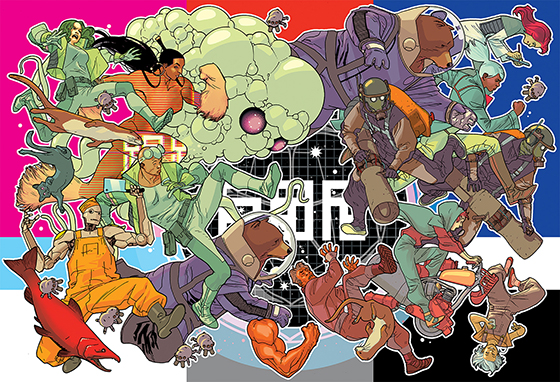
Join a huge cast including angry space techs, anxious energy workers, obsequious ramen robots, suspicious arcade owners, snack-driven vat-grown bears and correspondence school druids in this backstage adventure aboard a malfunctioning flying space rock. Grass of Parnassus is the legendary Immonens (RUSSIAN OLIVE TO RED KING, MOVING PICTURES, HELLCAT, STAR WARS) at their breakneck best.
Grass of Parnassus was originally published every Monday on Instagram by the Immonen’s at the height of the pandemic. It became must-read comics for me. I loved the experimentation of the form, the way they took full advantage of the limitations of Instagram as an experience, and the behind the scenes explanations of how much sheer effort they were pouring into the design of this thing.
But more than all that I loved the absurdity of the story itself. SCTV / KiTH like humour delivered in a bande dessinée style.
The other day I went back to look at the account they hosted on IG and sadly it was gone. I then found that the whole thing was published in book form and I just had to have it. This story was one of the few bright points I remembered during the worst of the pandemic and I needed it in my life.
I was really curious how the whole thing would convert to a traditional form factor and I’m genuinely impressed with how they’ve used page breaks/flips and their approach to the layout of the whole thing to preserve the feel that swiping on IG gave it.
Anyway… go read this comic. It’s great.
//
20 Years of Orcs, Guilds and Memes in World of Warcraft by Annie Aguiar at The New York Times
After World of Warcraft was released by Blizzard Entertainment in November 2004, millions of people paid monthly subscriptions to join guilds with their real-life friends or in hopes of making new ones. Soon it was being featured on “South Park” and in political campaigns. Then came the requisite Hollywood adaptation. The game has also spilled into unexpected spaces like cryptocurrency and epidemiology.
I’m a WoW enjoyer (despite its many flaws) and have written about it in the newsletter before. I had no idea until this article that notable piece of shit Steve Bannon got his start as a dirty fucking goldfarmer…
//
The Killing of Mohammad Bhar from Wikipedia
On 3 July 2024, the family said that a week after they had been trapped in a relative's home, Israeli forces raided the place with a combat dog, which proceeded to maul Mohammad's arm and chest. Mohammad, who had speech difficulties, started screaming at the dog: "Khalas ya habibi’ [enough, my dear]," according to them. The family described how Israeli forces then separated Mohammad from them to another room, where a military doctor arrived. They added that the Israeli forces later led them out of the house at gunpoint and prevented them from returning there until a week later, when they found Mohammad's bloodied, decaying body on the floor with worms starting to eat his face.
Khalas ya habibi.
//
UK Government Secretly Shuts Down NHS Pride Programme by Ben Hunte at Vice
After approving more funding for the project several months ago, whistleblowers tell VICE News that NHS England suddenly “u-turned and ghosted” those involved. Services have now been “wound down,” and some staff are struggling to work while NHS England refuses to communicate with them about what has changed. Responding to these claims, a spokesperson for the Department of Health and Social Care said, “taxpayers rightly expect value for money, which is why we expect the NHS and all of the department’s arms-length bodies to continuously review whether their diversity and inclusion roles are good value, and to always consider ways to improve.”VICE News understands that many people working directly on the project have not been told it will be ending. Those familiar with the plans said hospitals can expect to be briefed on the project closure “within the next few weeks.”
Speaking of bigotry…
My friend Dr. Michael Farquhar started the programme. And my wife Martha Bogert designed the first badge prototype. We’re all pissed at the news. More from Mike over on Twitter.
//
Palantir’s NHS-stealing Big Lie - Cory Doctorow
This approach is cheaper, safer, and more effective than handing hundreds of millions of pounds to Palantir and hoping they will manage the impossible: anonymising data well enough that it is never re-identified. Trusted Research Environments have been endorsed by national associations of doctors and researchers as the superior alternative to giving the NHS's data to Peter Thiel or any other sharp operator seeking a public contract.
I was one of a handful of whistleblowers that leaked Palantir’s involvement with NHSX at the start of the pandemic so I’m always keeping an eye out for how this develops. Great read from Cory about how much more effective trusted research environments are than whatever slop Palantir would deign to share.
//
Response to the Cass Review by Dr Hane Maung at Gender GP
The Cass Review is a profoundly flawed document that could result in significant harms to trans youth and young trans adults if its recommendations are implemented. Not only does it engage in flagrant evidence denial, but it makes several inaccurate claims and recommendations that are not supported by any evidence at all. Moreover, its openly cisheteronormative agenda, whereby cisgender identities are judged to be more desirable or legitimate than transgender identities, enacts the prejudice that is suffered by the trans community in the United Kingdom. It is our position that the Cass Review is an unethical and unscientific document that serves to legitimise a system that commits sustained injustices and harms to the trans community.
I’m shocked and appalled that outlets like The Guardian and charities like Mermaids are bending over backwards to praise the Cass Review. Harms were done to trans people when the interim release of the review happened a few years ago. If the recommendations are followed by the NHS, and it seems like they will be, then puberty blockers will be banned and no one under 25 will receive proper care at all.
This response from Dr. Maung is a great walkthrough of the many inaccuracies riddled throughout the review. From how unethical and unfeasible RCT demands are on gender-affirmative care, the deliberate exclusion of trans people from the study itself, and more.
This review serves only to give ground cover to bigots and paint anyone who disagrees with it as a fanatic or extremist.
//
The Canadian State Is Euthanizing Its Poor and Disabled - David Moscrop at Jacobin
For want of a mattress, a man is dead. That’s the story, in sum, of a quadriplegic man who chose to end his life in January through medically assisted death. Normand Meunier’s story, as reported by the CBC, began with a visit to a Quebec hospital due to a respiratory virus. Meunier subsequently developed a painful bedsore after being left without access to a mattress to accommodate his needs. Thereafter, he applied to Canada’s Medical Assistance in Dying (MAiD) program.
This is the result of defunding the very basics of healthcare. Politicians do this to line the pockets of vested business interests. The same fundamentals of this story is also playing out here in the UK too. If you’re an affluent able-bodied person then they want you to pay for private healthcare. And well if you’re not then just fuck off and die already.
//
Oxfam says $41 billion of the World Bank’s climate spending ‘effectively unaccounted for’ - David Kenner icij.org
The Oxfam report, titled “Climate Finance Unchecked,” alleges that poor record-keeping practices at the World Bank make it “impossible” to verify its expenditures and impact on climate finance. The international lending institution publishes assessments of a project’s budgeted spending on climate finance, not how much money is actually spent. The report estimated the difference between budgeted and actual expenditures amounted to tens of billions of dollars over six years.
An appalling–but sadly maybe not shocking–scandal. Just how badly is the World Bank greenwashing a new grift? Read the link and the report to find out. Shared via backchannels from one of my fave Nothing Here readers. Thanks its an eye-opener for sure.
//
Conditions so bad that prisoners set themselves on fire: Crisis and cover-up at Red Onion super-max by Phil Wilayto at SF BayView
“He told me simply that the racism, the horrid and inhumane conditions at the prison, were so intolerable that he and others were setting themselves on fire in desperate attempts to get transferred. These were not protests, he made clear, but acts of desperation hoping to get out of an insufferable situation.”
In case you’ve forgotten how ghastly mass incarceration in the US gets then here’s an absolute horror story out of the Red Onion supermax prison in Virginia.
//
Before I wrap I wanted to mention that I was genuinely proud of this bonus letter I wrote back in April about Israel’s use of AI in the war on Gaza. If you haven’t had a chance to read it yet then I’d be grateful if you did.
Lidia Zuin
Journalist, MA in semiotics, and PhD in Arts.
Soooo… 'tis season for a retrospective! Instead of listing some links and news, I will list my favorite books, movies, music, series, and games I tried this year.
Favorite book: Satanic Feminism, by Per Faxneld

What a ride to read this almost 600-page adapted PhD thesis about the history of the encounters between satanism and feminism. Though the focus was on the 18th century forward, Faxneld is absolutely thorough and almost anything escapes him. It's rather interesting to me because the author is Swedish and I live in Sweden, so he brings some Scandinavian references that were quite obscure to me, like Scandinavian occultists apart from Swedenborg, which is more popular among people interested in the topic.
It was also interesting that he talks about Sarah Bernhardt, someone I ridiculously didn't know about before visiting the Pére La-Chaisse cemetery in Paris and then figuring out she was a super goth mama back in the day, to the point that she slept in a coffin and only dressed in black. But to me, it was even more amazing to learn she was actually a multifaceted artist who was known for her acting and singing, but she was also a sculptor who created a bust of herself like a demon woman and pushed the limits of gender roles in fashion back then. And together with her I also learned about Theda Bara and Luisa Casatti, women who also dwelled in the high society of the late 19th century like OG whimsigoth baes.
Truly recommend the book if you're ok with academic writing and super in-depth dives into the topic and a quite good focus on queer-related references.
//
Favorite movie: The First Omen

Unfortunately, 2024 wasn't a good year for me when it comes to movies, in the sense that I didn't watch them as much as I used to do before. This is definitely my New Year's resolution. But, anyway, this one I watched at the movies and it was a great surprise. Though I'm sick of prequels, sequels, and remakes of classics, this prequel to The Omen did a great job honoring the original and other horror gems – despite not being so subtle about it, to the point that the DiCaprio pointing meme stopped to be a mood to become a nuisance.
It is also a great surprise to find the Brazilian actress Sonia Braga in it, portraying the main antagonist, an Italian madre superiora who is cold and cool AF. The main actress, Nell Tiger Free, was also a good surprise since it was my first time watching a movie with her. But, on the other hand, I think Ishtar Currie Wilson simply ATE the movie by just appearing for a few minutes in an iconic suicide scene which is always the thumbnail for all things related to The First Omen. Honestly, girl, I hope you have a brilliant career ahead and I'm looking forward to seeing you play Mia Goth's sister! Also, shout out to Mia in Maxxxine, I just didn't watch it yet… but hey there's still a week before 2025, so let's see.
//
Favorite music: Ellende - Todbringerin
Though my Spotify Wrapped was all about Grima and Mgla, when it comes to new releases, the new Todbringerin was what made me see them live in Copenhagen. They sort of remastered some songs from the previous album Todbringer (which is like the male version of the word, meaning Death Bringer in German) but also added some great new tracks full of ambiance and samples. Their performance live was quite good too, so it was definitely my highlight of the year in terms of releases.
Other honor mentions:
Spectral Wound - Songs of Blood and Mire - saw them in Copenhagen, though they are not that charismatic live, the album is pretty solid. Highlight goes to the track Aristocratic Black Metal, like wtf lol
Psychonaut 4 - …of mourning - great band, gonna see them next year.
Agriculture - Life is Easy - love the irony, loved them playing live in Eindhoven!
Olhava - Sacrifice - didn't hit as hard as Reborn and more post-rock/shoegazey than BM now, but still good stuff
//
Favorite series: Severance

Though it's a 2022 series, I only watched it this year. I really liked the concept, it's very well executed too and the whole ambiance giving the 70s aesthetic to officecore is just so interesting. Well the premise of the series is that people who work at this company are "severed", so the minute they enter the building, they forget who they are outside, which means they become completely different people. There are a lot of implications for that, of course, not just the ethical part of it, but also topics like depression (being depressed outside of work but acting differently at the office), sexual orientation (being straight or thinking you are outside of the office), and so on.
I like that the 70s vibe to the office makes it look like it's even cool to be a white-collar worker, in the same vibe of “if we're going to live in fascism then at least make it fashionable” lol. But it is interesting to see the contrast between the empty surgical green office spaces to the “real world”: it’s peak winter, so it's dark and snowy all the time, so the bright lights of the office give even a bit of a feeling of how it is better inside there. I also love how they portray pettiness and competitiveness among employees, especially when the task is so fucking dumb – ain't it just like IRL? Anyway, try to check this one out next year, if you haven't yet. There's a new season coming up too.
//
Favorite game: Baldur's Gate 3
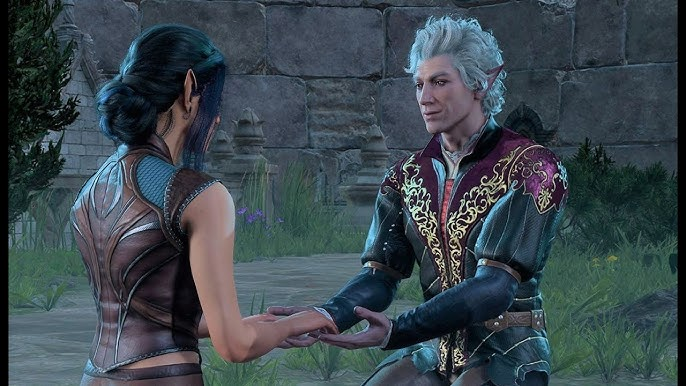
Yes, I only got to play it this year and I just joined the cult of obsessed people who only talk about it and simp the vampire twink Astarion. It's crazy how a company the size of Larian could make such a complex, detailed, involving, well-written game like this one, using a system so complex like DnD and making it an open world with multiple choices. It's crazy how even the smallest decisions can have different consequences, and that explains why people play the game over and over again - besides all romance options.
In my case, I prefer to just check different outcomes on YouTube, but still, I'm on my third run (ok, 2,5) playing as Dark Urge, this origin character that you can still customize in appearance, class and race. You can also play like the origin characters and some things might be pretty different, like having new companion characters (Gale's tressym Tara) and cutscenes like Astarion's nightmare with Cazador.
While the company isn't going to work on DLCs or anything like that, patches are often released, mods are now officially supported, and the voice actors are constantly joining shows and even playing DnD with their characters, so there's a whole universe of content and… food for obsession.
The Memes
![Top Row: JOBS NOW: Tiktoker (a femjack with pink hair and a pink shirt), Standup Comedian (a wojack with far too many lines on his face from smiling so large), Influencer (a wojack that looks kinda like ET), Cosplayer (a femboy type wojack wearing a black hoodie, black collar, with half-black, half-green hair). Second Row: JOBS IN THE FUTURE (text slightly glitched): (The images here are all glitched out and/or fucked up wojack style images, difficult to describe by their nature. Apologies) Gravity eater, quantum hunter, Glitch dreamer, void deer, boson cutter, [the final one is indecipherable].](https://assets.buttondown.email/images/5565c2c1-e002-4898-9b46-6db92daa97b7.jpg?w=960&fit=max)
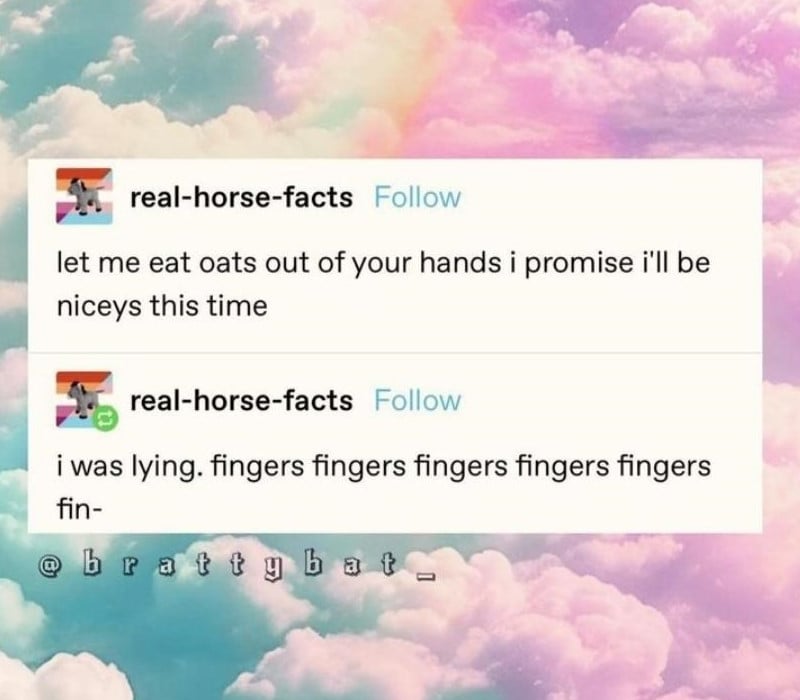
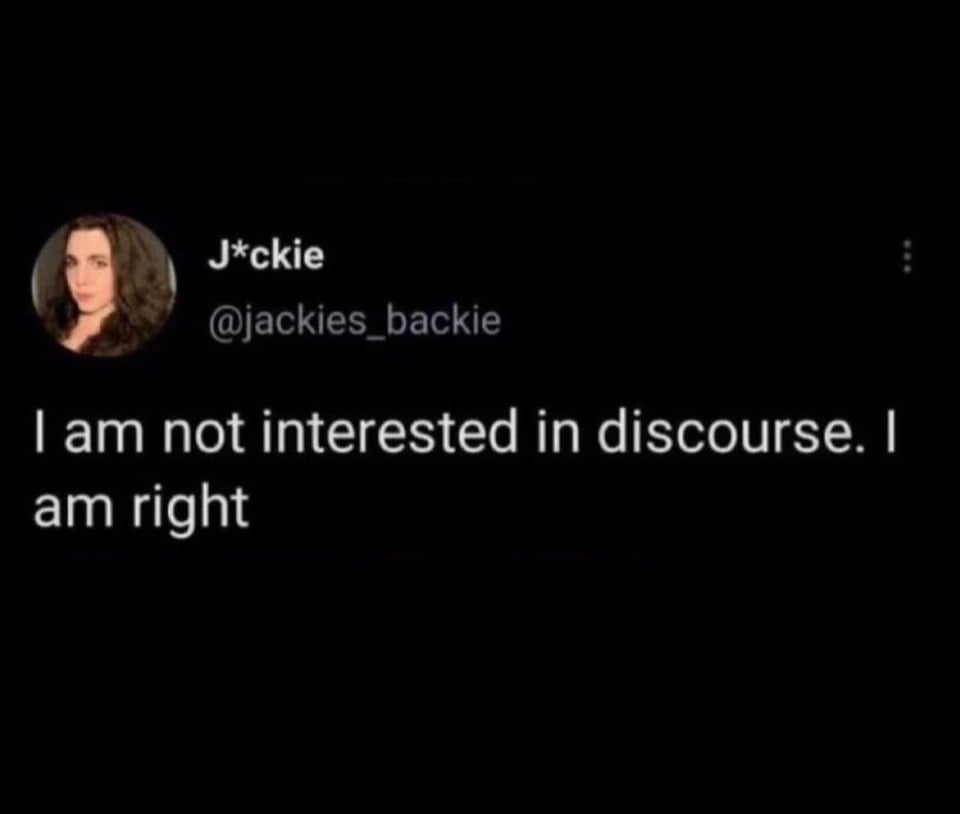
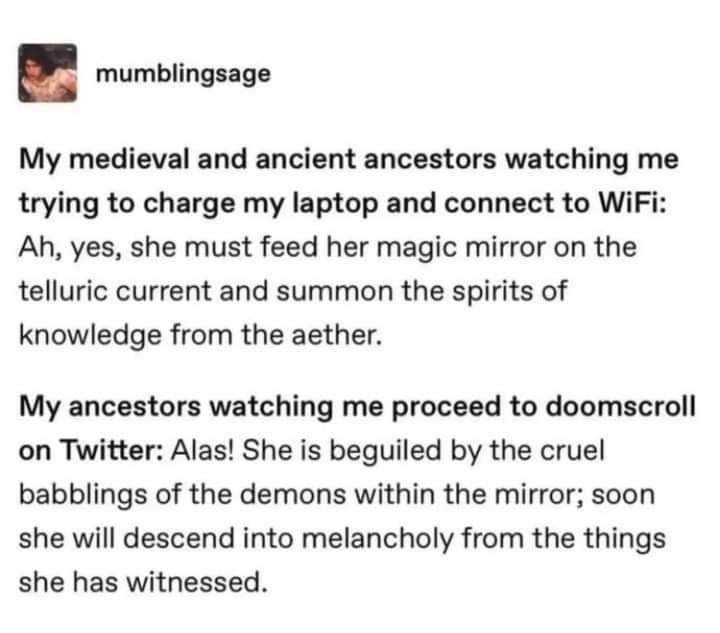

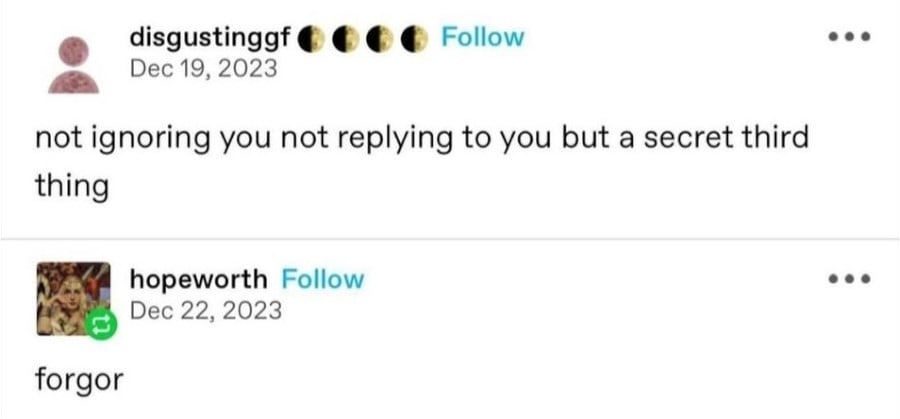

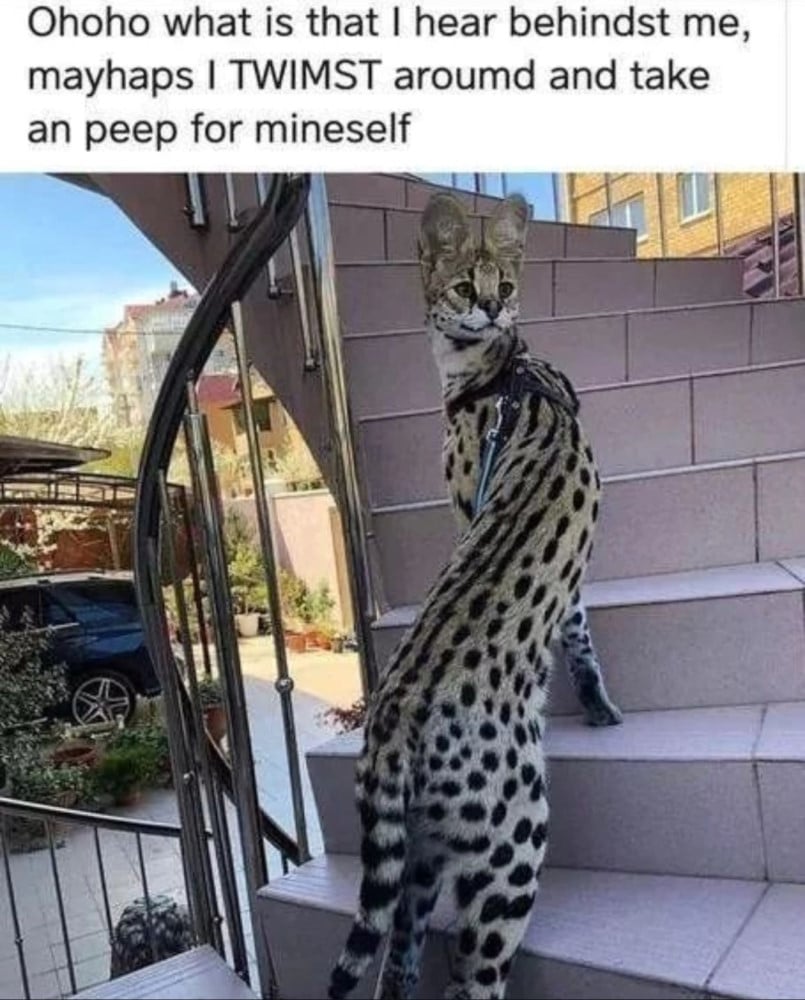

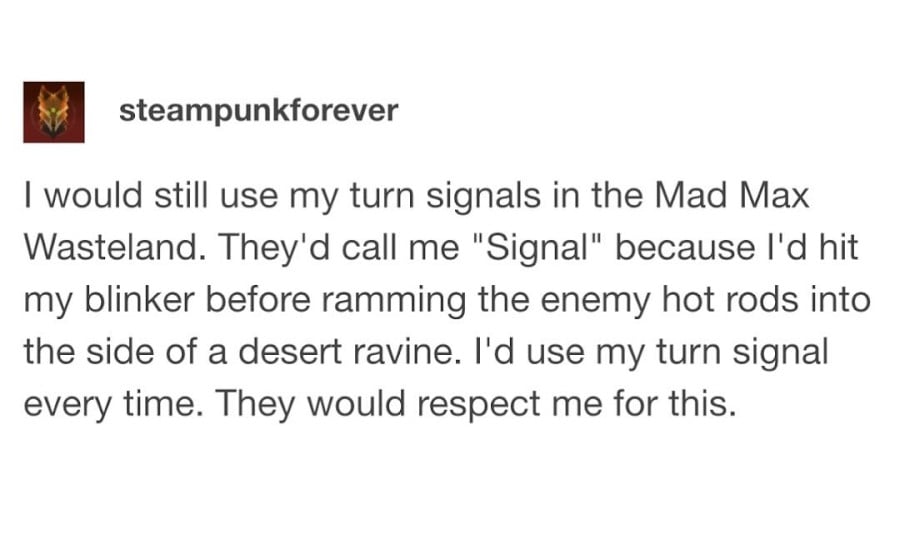
![A tiny fox/dog type animal sitting on its but with its back legs straight forward. It is staring out the window of an RV that's on the road (I think?). Top text reads: ultimately I have to be brave [CJW adds: it is a big world out there, and she's just a tiny little animal.]](https://assets.buttondown.email/images/417683cf-822f-4ade-93b8-4b882bb3aa29.png?w=960&fit=max)
You just read issue #277 of Nothing Here. You can also browse the full archives of this newsletter.